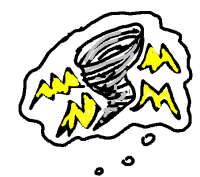2006.08.19
It's surprisingly difficult to objectively determine my strengths and weaknesses. Whether that's just a fundamental limitation of self-aware beings, or from years of going through a school system that sometimes valued self-esteem over personal achievement, or self-evaluation being one of my personal "weak" areas, or what, I'm not sure.
What started me musing on this lately is this dumb Atari Age flamewar. "Random Terrain" (who reports to have Asperger's Syndrome) thought that my dislike of pretending that the ship in Asteroids was actually piloted by the Star Wars guys, or thinking that "Pitfall!" might not have been inspired by "Raiders of the Lost Ark" because Pitfall Henry has none of the visual cues of Indiana Jones implies that I suffer from a certain rigidity in thinking (a condition he has himself struggled with.)
This accusation irked me to no end. And so I've been trying to think of solid examples of good flexible thinking in my life. Of course, the first things I think of our my limitations. Like listening to Paul Simon... I feel like there's a tiny chance I could have picked up on "Slip-Slidin' Away" as a lyric, but I don't think I could have thought to follow it up with "The nearer your destination, the more you're slip-slidin' away." Tim points out that trying to go against Paul Simon as a lyricist is kind of like berating myself for not being able to hold my own against Michael Jordan in one-on-one, but still. (I don't have the book in front of me, but one idea in Horby's "Polysyllabic Spree" that blew me away is that he thinks it's not coming up with content that's difficult, it's the writing itself. The main reason I don't write much fiction is that I can't think of the plot, or the point of what I want to say. And if writing is though part, why does so much literature feel semi-autobiographical?) )
These ideas really seem to important to me as my profession as a software developer, since in some ways it is the "life of the mind"... the geek mind, but still the mind. On many fronts I suffer in comparison to Tim, who has a very powerful recollection and an ADD-fueled ability to see the forest and the trees at the same time. I really envy his memory sometimes; mine seems terrible, and I'm constantly having to supplement my own weak one with written text files and little databases. (Of course, he rightly thinks that my biggest problem as a developer is lack of confidence, which ties into how I get intimidated by any project that might show I'm not as smart as I like to assume I am.)
But... I fancy myself a smart guy. But if it's not memory, and if I'm not particularly good at puzzles, and maybe not even imaginative thinking, what the hell am I good at?
I think I'm good at seeing connections. My thought patterns tend to be tremendously tangential, so it stands to reason that I might be better than average at tracing thoughts and seeing connections.
Mentally, I'm pretty fast. They say there's a tremendous correlation between reading speed and standardized test scores. I always had time to go back and double check every answer, and then some.
Wow.
 You know what that means? Maybe I'm smart in the same way a computer is good at chess. Not really smart-smart, not particularly great with patterns or new ideas, but able to spin out a whirlwind of permutations and combinations and tangents, discarding bad ideas with filters on the fly, and fast, fast, fast.
Maybe this IS one of my introspection Holy Grails: the Grand Unifying Theory of my brain. I'll have to live with this idea for a while and see what I make of it over time. I know it help explains a certain type of joke I make frequently, where I mishear something, autocorrect it, but notice that the misheard version is a bit funny, and then act as if that's what I thought was said.
You know what that means? Maybe I'm smart in the same way a computer is good at chess. Not really smart-smart, not particularly great with patterns or new ideas, but able to spin out a whirlwind of permutations and combinations and tangents, discarding bad ideas with filters on the fly, and fast, fast, fast.
Maybe this IS one of my introspection Holy Grails: the Grand Unifying Theory of my brain. I'll have to live with this idea for a while and see what I make of it over time. I know it help explains a certain type of joke I make frequently, where I mishear something, autocorrect it, but notice that the misheard version is a bit funny, and then act as if that's what I thought was said.
This really gets me wondering, how different can brains be, like on a physiological basis? You hear stories where people lose half their brain matter, but the rest learns to compensate. And because we have so much in common, language, human experience in general, it's easy to think that the processes underneath those layers are pretty much the same. But who knows... maybe as we construct our brains growing up (a biological constructive imperative, like a spider is compelled to make webs), we end up with brains that are really quit different, even if they all fit somewhere on the same bellcurves of multiple intelligence.
